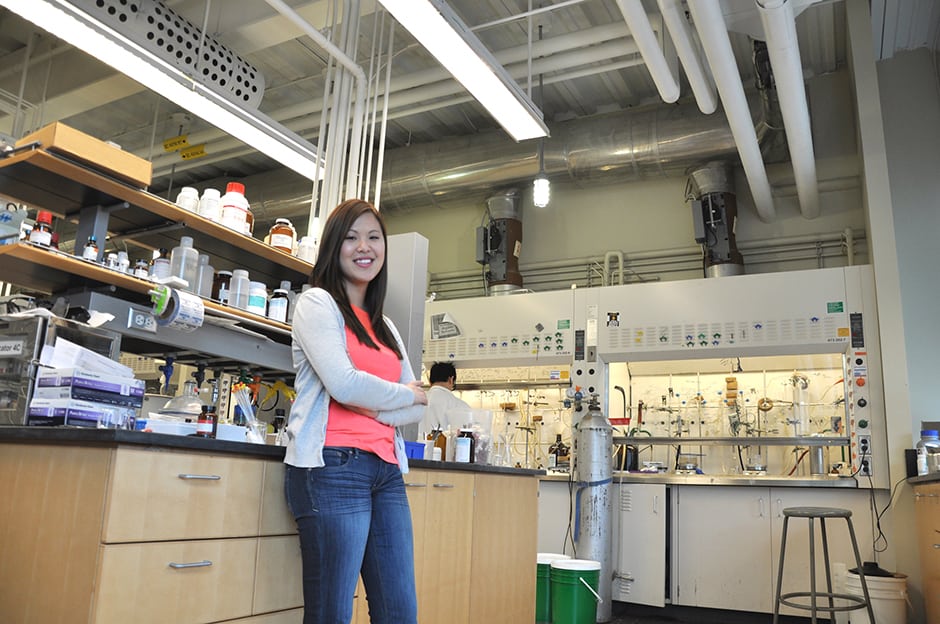U of T TA Christine Le became interested in science at a young age, inspired by a “natural curiosity for the world around [her]” and “enthusiastic and supportive teachers.” Le was recently named to Forbes’ 30 under 30 in science for her research in organic chemistry, focusing on environmentally friendly catalytic reactions. The Varsity spoke to Le about her accomplishments, her research, and her advice for science students.
The Varsity: How does it feel to have made the Forbes list? What has the reaction to that been like?
Christine Le: I am incredibly honoured to be named to Forbes’ 30 Under 30 in Science. Only 12% of the 600 people named to this list are from countries outside of the United States, which makes me feel proud to represent U of T as a leading research institution in both Canada and North America. Since the announcement, I have received a tremendous amount of support from my colleagues, friends and family, which further motivates me to continue working towards my goals.
TV: Can you tell me a bit about your current research?
CL: As a graduate student in the Lautens group, we are mainly interested in developing reactions that can be applied to the synthesis of drugs in the pharmaceutical industry. To increase the efficiency of these processes, we often use transition-metal catalysts, which are able to speed up the rate of the chemical reactions without being consumed. This means that we can, in practice, recover and re-use the catalyst after the reaction is complete, therefore minimizing the production of waste. A common theme to the research that I have conducted in this area involves developing “atom economical” reactions, which means that all the atoms of the starting material are incorporated into the product, and that no wasteful by-products are produced.
TV: Environmental efficiency is part of your research approach. Can you speak to why this is important for chemical industries?
CL: Chemical industries are now incorporating more techniques that are in line with the principles of “green chemistry”, which outline the ways in which chemical research can reduce the production of substances that are hazardous to the environment and/or human health. Although the concept of green chemistry is relatively new, this area of research has gained a great deal of momentum within the last decade due to an increasing awareness of current environmental issues, such as global warming, pollution, and limited natural resources.
TV: You also work as a TA and helped design a new tutorial approach for second-year science students. What do you think is key to effectively teaching students chemistry concepts?
CL: I believe that the key to succeeding in chemistry courses is to understand the basic concepts, rather than rote memorizing. I always try to encourage my students to understand why chemicals react the way they do, as opposed to simply telling me the outcome of the reaction. Once a student can grasp the basic reactivity of molecules, solving complex problems becomes a much less arduous task.
TV: Do you have any advice for students presently taking science courses, and particularly for those looking to pursue research?
CL: As an undergraduate student pursuing a degree in science, you are required to take a number of different science courses. In general, there are going to be some topics you enjoy learning about more than others. If I were to give one piece of advice for students, it would be to put more effort into the subjects that you struggle with the most — even if it requires hiring a tutor or visiting a professor during office hours. Once you have gained the motivation and dedication to do so, you will be more adept at dealing with any other challenges you may be faced with in life. A passion for science is a definite pre-requisite for pursuing research. Learning about science in lectures and textbooks is very different from conducting research. As graduate students in chemistry, we are at the forefront of scientific innovation and technology. Despite the challenges that we are faced with on a daily basis, making new discoveries, however small, motivates me to continue doing research. Our role as researchers is to make the small steps needed to solve the larger scientific problems.
TV: What are your plans moving forward?
CL: After completing my PhD, I hope to one day have my own research group. Although I am not sure what type of research I hope to do in the future, I would like to do more interdisciplinary work by bridging the gaps between organic chemistry and other scientific fields (e.g. biology, medicine, engineering).
This interview has been edited and condensed for clarity and length.


